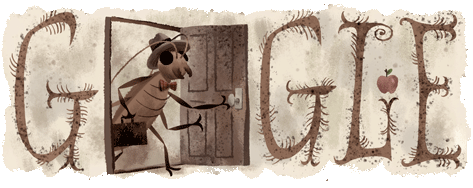 Franz Kafka’s famous and frightful novelette Die Verwandlung (The Metamorphosis) has spawned almost as many interpretations as any cockroach, but one angle that most of them agree on is that the protagonist Gregor Samsa, very closely identified with Kafka himself, is being judged or somehow weighed and found wanting, through his transformation into a giant insectoid specimen of vermin, and that the fault or sin he has been condemned for is some sort of failure to live or to fully measure up to what it means to be human. And one of the failings often cited is Kafka’s own experience of being condemned by his overbearing father for his introverted, bookish habits. (The very name Samsa, although resembling Kafka’s own surname closely, also recalls the Czech word sám, meaning alone). Luckily for readers and introverts everywhere, though, Kafka left on record some far more positive comments about the importance of reading, books, and the written word.
Franz Kafka’s famous and frightful novelette Die Verwandlung (The Metamorphosis) has spawned almost as many interpretations as any cockroach, but one angle that most of them agree on is that the protagonist Gregor Samsa, very closely identified with Kafka himself, is being judged or somehow weighed and found wanting, through his transformation into a giant insectoid specimen of vermin, and that the fault or sin he has been condemned for is some sort of failure to live or to fully measure up to what it means to be human. And one of the failings often cited is Kafka’s own experience of being condemned by his overbearing father for his introverted, bookish habits. (The very name Samsa, although resembling Kafka’s own surname closely, also recalls the Czech word sám, meaning alone). Luckily for readers and introverts everywhere, though, Kafka left on record some far more positive comments about the importance of reading, books, and the written word.
Brain Pickings, the blog of the brilliant Bulgarian American writer and commentator Maria Popova, recently posted a tribute to Kafka’s advocacy of books, including some of his most memorable quotes on the subject, such as:
We need the books that affect us like a disaster, that grieve us deeply, like the death of someone we loved more than ourselves, like being banished into forests far from everyone, like a suicide. A book must be the axe for the frozen sea inside us. That is my belief.
That hardly argues for books and reading as a route to a grotesque solitary transformation.
However, Kafka was profoundly ambivalent towards writing, language, and expression as a whole. He also wrote that “books are a narcotic,” and less positively, that “all language is but a poor translation” and that “writing is utter solitude, the descent into the cold abyss of oneself.” Remember, as well, that it was Kafka who, in In der Strafkolonie (In the Penal Colony), came up with the idea that a printing press itself could be a means of torture and an instrument of execution, by literally pressing a written code of law into the flesh of its victims. You couldn’t wish for a better parable of the power of the Word – in some not so pleasant senses as well.
































It may not have been his father complaining about the bookish habits but his mother who in his early years insisted he wear girls’ clothes as she wanted a girl, not a boy. that in my mind best explains how he got the idea of the cockroach – a living being fervently rejected for its “other-ness”.